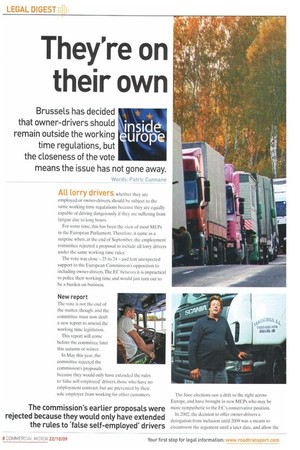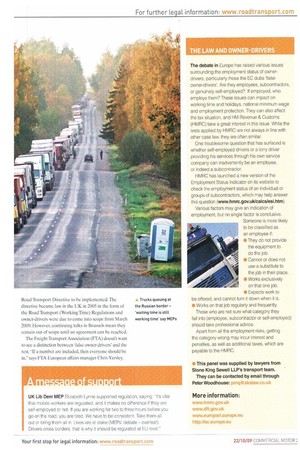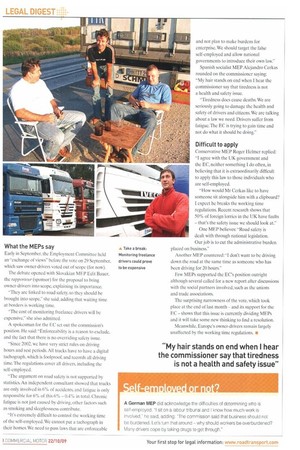They're on their own
Page 28

Page 29

Page 30

If you've noticed an error in this article please click here to report it so we can fix it.
Brussels has decided
that owner-drivers should insid remain outside the working eu rope time regulations, but N
the closeness of the vote means the issue has not gone away.
Words: Patric Connane AU Lorry drivers, whether they are employed or owner-drivers, should he subject to the same working time regulations because they are equally capable of driving dangerously if they are suffering from fatigue due to long hours.
For some time, this has been the view of most MEPs in the European Parliament. Therefore. it came as a surprise when, at the end of September, the employment committee rejected a proposal to include all lorry drivers under the same working time rules.
The vote was close —25 to 24— and lent unexpected support to the European Commission's opposition to including owner-drivers. The EC believes it is impractical to police their working time and would just turn out to he a burden on business.
New report
The vote is not the end of the matter, though, and the committee must now draft a new report to amend the working time legislation.
This report will come before the committee later this autumn or winter.
In May this year, the committee rejected the commission's proposals because they would only have extended the rules to 'false self-employed' drivers, those who have no employment contract, but are prevented by their sole employer from working for other customers. The June elections saw a drift to the right across Europe, and have brought in new MEPs who may be more sympathetic to the EC's conservative position.
In 2002, the decision to offer owner-drivers a derogation from inclusion until 2009 was a means to circumvent the argument until a later date, and allow the Road Transport Directive to be implemented. The directive became law in the UK in 2005 in the form of the Road Transport (Working Time) Regulations and owner-drivers were due to come into scope from March 2009. However, continuing talks in Brussels mean they remain out of scope until an agreement can be reached.
The Freight Transport Association (FTA) doesn't want to see a distinction between 'false owner-drivers' and the rest. "If a number are included, then everyone should be in," says PTA European affairs manager Chris Yarsley. What the MEPs say
Early in September. the Employment Committee held an "exchange of views" before the vote on 29 September, which saw owner-drivers voted out of scope (for now).
The debate opened with Slovakian MEP Edit Bauer. the rapporteur (sponsor) for the proposal to bring owner-drivers into scope, explaining its importance.
-They arc linked to road safety so they should be brought into scope,she said, adding that waiting time at borders is working time.
"The cost of monitoring freelance drivers will be expensive," she also admitted.
A spokesman for the EC set out the commission's position. He said: "Enforceability is a reason to exclude, and the fact that there is no overriding safety issue.
"Since 2002, we have very strict rules on driving hours and rest periods. All trucks have to have a digital tachograph, which is foolproof, and records all driving time The regulations cover all drivers, including the self-employed.
"The argument on road safety is not supported by statistics. An independent consultant showed that trucks are only involved in 6% of accidents, and fatigue is only responsible for 6% of this 6% — 0.4% in total. Chronic fatigue is not just caused by driving, other factors such as smoking and sleeplessness contribute.
"It's extremely difficult to control the working time of the se If-employed.We cannot put a tachograph in their homes. We need to pass laws that are enforceable and not plan to make burdens for enterprise. We should target the false self-employed and allow national governments to introduce their own law."
Spanish socialist MEP Alejandro Cerkas rounded on the commissioner saying: "My hair stands on end when I hear the commissioner say that tiredness is not a health and safety issue.
"Tiredness does cause deaths. We are seriously going to damage the health and safety of drivers and citizens. We arc talking about a law we need. Drivers suffer from fatigue. The EC is trying to gain time and not do what it should he doing."
Difficult to apply
Conservative MEP Roger Helmer replied: "I agree with the UK government and the EC, neither something I do often, in believing that it is extraordinarily difficult to apply this law to those individuals who are self-employed.
"How would Mr Cerkas like to have someone sit alongside him with a clipboard? I expect he breaks the working time regulations. Recent research shows that 50% of foreign lorries in the UK have faults — that's the safety issue we should look at."
One MEP believes: "Road safety is dealt with through national legislation. Our job is to cut the administrative burden
Take a break: placed on business" Monitoring freelance Another MEP countered: "I don't want to be driving drivers could prove down the road at the same time as someone who has to be expensive been driving for 20 hours."
Few MEPs supported the EC's position outright although several called for a new report after discussions with the social partners involved, such as the unions and trade associations.
The surprising narrowness of the vote, which took place at the end of last month — and its support for the EC — shows that this issue is currently dividing MEPs and it will take some new thinking to find a resolution.
Meanwhile, Europe's owner-drivers remain largely unaffected by the working time regulations. •
















































































































































